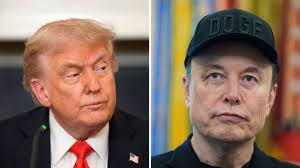‘It’s ridiculous’: Donald Trump mocks Elon Musk’s ‘America Party’, says it’s good for ‘chaos’

Donald Trump Calls Elon Musk’s ‘America Party’ Ridiculous, Warns of Political Chaos
Former U.S. President Donald Trump has openly mocked tech billionaire Elon Musk over his rumored political ambitions, particularly the launch of the so-called “America Party”. In a recent off-the-cuff remark during a campaign stop, Trump dismissed Musk’s effort as “ridiculous” and suggested it would only fuel “chaos” in the already polarized American political system.
While Musk has yet to formally confirm the formation of any political party, the speculated emergence of a new centrist movement has sparked intense speculation. Trump, known for his aggressive campaign style and direct rhetoric, wasted no time weighing in.
“It’s ridiculous. Elon should stick to rockets and electric cars,” Trump said to a roaring crowd. “What he’s doing is just good for chaos, and frankly, it helps the Democrats.”
Trump and Musk: A Tense History
The relationship between Donald Trump and Elon Musk has long been uneasy. Musk initially served on White House advisory councils during Trump’s presidency but resigned in 2017 after Trump pulled the U.S. out of the Paris Climate Accord. Since then, their occasional social media spats and contrasting views have added layers of tension.
Despite some overlapping interests—such as opposing censorship and challenging mainstream narratives—their personalities and visions for America differ significantly. Trump’s populist, nationalist approach doesn’t align with Musk’s technocratic and libertarian tendencies.
Trump’s recent remarks suggest he views Musk not as an ally in disrupting the status quo but as a potential threat to his base and campaign momentum.
What Is the ‘America Party’?
Although Musk has not officially launched a party, reports from political insiders and tech journalists suggest that he has floated the idea of backing a third-party movement, possibly under the banner of the “America Party.” The initiative reportedly aims to attract disillusioned moderates from both the Democratic and Republican camps.
Musk has previously expressed dissatisfaction with the two-party system, arguing that it fails to represent a wide swath of Americans. In 2022, he tweeted:
“A third party that is centrist, rational, and fact-driven would do better than people think.”
His critics, including Trump, argue that Musk’s flirtation with political disruption could split the conservative vote and hand the 2024 or 2028 election to the Democrats.
Trump’s Real Concern: Vote Splitting
Behind the bluster, political analysts suggest Trump’s comments reflect a deeper strategic concern. A third-party candidate—especially one with Musk’s resources, celebrity, and tech-savvy following—could siphon off crucial votes in key swing states.
Trump is no stranger to the dangers of vote-splitting. In 2016, third-party candidates like Gary Johnson and Jill Stein made modest but notable dents in the vote count. In a closely divided electorate, even a 1–2% swing can determine the outcome.
By branding Musk’s movement as a “chaotic” distraction, Trump is attempting to delegitimize it before it gains any serious traction.
“He’s smart, but he doesn’t know politics,” Trump added. “This isn’t Twitter. This is the real world.”
Musk’s Growing Political Influence
Despite not holding public office, Musk’s influence on American politics has grown exponentially. His ownership of X (formerly Twitter) has positioned him at the heart of the digital town square. Through policy commentary, meme-sharing, and subtle endorsements, Musk now wields soft political power rivaling that of traditional media figures.
In recent years, Musk has commented on immigration, inflation, military aid to Ukraine, and even endorsed Republican candidates in midterms. His rising political profile has raised alarms not just for Trump, but for leaders across the spectrum.
If the “America Party” turns into a real platform, Musk could attract younger voters, independents, and those frustrated with the dysfunction of Washington.
Could the ‘America Party’ Succeed?
Historically, third parties have struggled to break through in the U.S. political system due to structural barriers, lack of funding, and the perception of wasted votes. However, with a billionaire at the helm and a base of millions of digital followers, Musk’s venture could rewrite the rules.
Still, the path ahead would be steep. Ballot access laws differ by state, and major media coverage tends to favor established parties. Moreover, Musk would have to translate online popularity into real-world organizing—a task that has eluded many internet-born movements.
Trump and his advisors are betting that Musk will not follow through or that his potential political venture will collapse under its own weight. But they are clearly not ignoring the possibility.
A Preview of 2028?
Many observers believe Musk’s timing may not align with 2024’s election cycle. Instead, a 2028 launch would give him more time to build infrastructure, recruit candidates, and test public sentiment.
Some speculate that Musk may not run himself but could act as a kingmaker, backing others who align with his vision of free speech, innovation, and anti-establishment reform.
Either way, Trump’s outburst signals that he sees Musk as more than a curious sideshow. In the world of high-stakes American politics, even the richest man on Earth is fair game.
Final Thoughts
Trump’s verbal attack on Musk reflects more than personal rivalry—it underscores the delicate dynamics of political loyalty, power, and disruption in the U.S. today. Whether the “America Party” becomes a viable force or fizzles out remains to be seen, but the clash between two of the country’s most polarizing figures is sure to dominate headlines in the months to come.
As voters grow increasingly disenchanted with both major parties, nontraditional voices like Musk’s may find greater resonance. But if Trump has his way, they’ll do so without undermining his grip on the Republican base.






